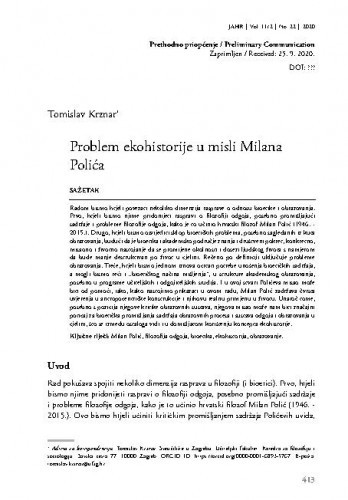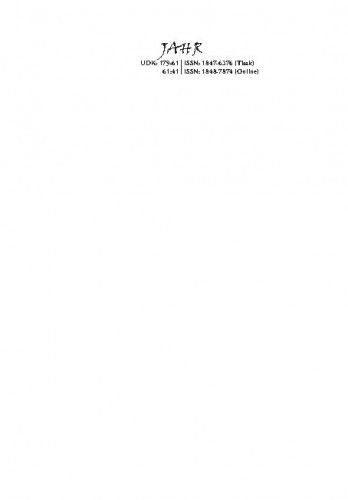Radom bismo htjeli povezati nekoliko dimenzija rasprave o odnosu bioetike i obrazovanja. Prvo, htjeli bismo njime pridonijeti raspravi o filozofiji odgoja, posebno promišljajući sadržaje i probleme filozofije odgoja, kako je to učinio hrvatski filozof Milan Polić (1946. - 2015.). Drugo, htjeli bismo osvijetliti sklop bioetičkih problema, posebno sagledanih i kuta obrazovanja, budući da je bioetika i akademsko područje znanja i društveni pokret, konkretno, misaono i životno nastojanje da se promijene okolnosti i dosezi ljudskog života s namjerom da bude manje destruktivan po život u cjelini. Rečeno po definiciji uključuje probleme obrazovanja. Treće, htjeli bismo jednom iznova ocrtati potrebe unošenja bioetičkih sadržaja, a mogli bismo reći i „bioetičkog načina mišljenja“, u strukture akademskog obrazovanja, posebno u programe učiteljskih i odgojiteljskih studija. I u ovoj stvari Polićeva misao može biti od pomoći, iako, kako nastojimo prikazati u ovom radu, Milan Polić zadržava čvrsta uvjerenja u antropocentričke konstrukcije i njihovu realnu primjenu u životu. Unatoč tome, posebno s pozicija njegove kritike obrazovnih sustava, njegova misao može nam biti značajni poticaj za bioetička promišljanja sadržaja obrazovnih procesa i sustava odgoja i obrazovanja u cjelini, što se između ostaloga vidi i u domišljatom korištenju koncepta ekohistorije.; With this paper, we would like to connect several dimensions of the discussion on the relationship between bioethics and education. First, we would like to open a discussion on the philosophy of education, especially considering the contents and problems of the philosophy of education as the Croatian philosopher Milan Polić (1946-2015) considered it. Secondly, we would like to shed light on a set of bioethical problems, especially from the perspective of education, since bioethics is not only an academic field of knowledge but also a social movement. In that matter, it is a concrete, mental, and life effort to change circumstances and reach human life, that is the life as a whole. That, by definition, includes the problems of education. Third, we would like to re-outline the need to introduce bioethical content, and we could say the “bioethical way of thinking”, into the structures of academic education, especially in the programs of teacher education. In this matter, too, Polic’s thought can be helpful. Although, as we try to show in this paper, Milan Polić maintains strong beliefs in anthropocentric constructions and their real application in life, especially from the standpoint of his critique of educational systems, his thought can be a significant stimulus for bioethical considerations as a whole, which can be seen, among other things, in the ingenious use of the concept of ecohistory.
Sažetak

 JAHR : europski časopis za bioetiku = European journal of bioethics : 11,22(2020) / glavni urednik, editor-in-chief Igor Eterović.
JAHR : europski časopis za bioetiku = European journal of bioethics : 11,22(2020) / glavni urednik, editor-in-chief Igor Eterović.